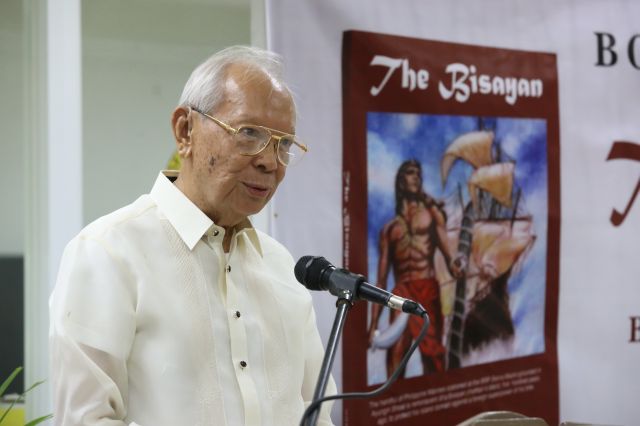
Former COA commissioner Sofronio Ursal during the book launching at the Cebu City Public Library. (CDN PHOTO/JUNJIE MENDOZA)
A book on the life of chieftain Lapu-Lapu, the first Filipino hero, was launched yesterday in time for the celebration of National Book Week.
“The Bisayan” written by lawyer Sofronio Ursal tackles historical accounts of the life of Lapu-Lapu and his encounter with Magellan along with the first group of Spaniards that arrived in Cebu in 1521.
Though his book is partly fiction, Ursal, former commissioner of the Commission on Audit, said it will encourage readers to appreciate history.
“As a man goes old, he would prefer to look back than to look forward. I find pleasure in going through accounts of our history. And this book is the product of that love for history,” he said during the book launching at the Cebu City Public Library Hall.
Present during the event were Lapu-Lapu City Mayor Paz Radaza, Cordova town Mayor Adelino Sitoy, and Cebu City Vice Mayor Edgardo Labella.
In her message, Radaza said she was happy over Ursal’s decision to write an in-depth study about Lapu-Lapu.
“Yes, the book is partly fiction. But there’s that noble intention to relive that glorious past so it won’t be forgotten,” she said.
Radaza said she believes “The Bisayan” will cultivate the desire of young people to look back at history for a better appreciation of the present.
“I’m confident that with this book, the glorious past will never be forgotten. The people of Lapu-Lapu City will forever be grateful to Atty. Ursal for what he has done,” she said.
Sitoy discussed Mactan’s history and Cebu City’s history to remind people about what transpired in the past.
“The Bisayan” answers questions about Portuguese explorer Ferdinand Magellan’s travel into the Visayan seas in 1521, and salient details about Lapu-Lapu.
Ursal said the story of “The Bisayan” is a product of artistic license using history and folklore as binding elements, and should be taken as such.